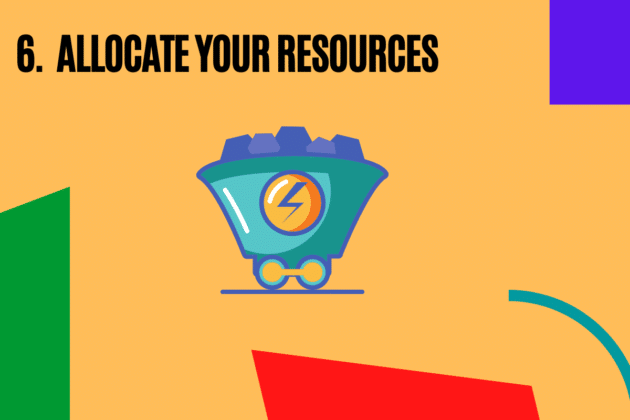If you’re keen to learn how to create a marketing plan for startups, the first picture is this: You’ve just launched your startup and you’re excited to no end. Your idea sounds cool, and it’s already been validated by outside experts. You might already have a few customers testing and using the product.
But now you need to get more customers, in order to sustain, grow and prosper.
That brings you to a critical question: how should you go about marketing your startup? How can you continue the momentum and get to work with a larger number of customers? Most importantly, how can you create a marketing plan for your startup?
Anyone who has ever kicked off a startup, or even worked in one, will know things are often super crazy in a startup. There are often no fixed working hours and startup teams work really hard. Things are typically unorganized, and priorities change often on a weekly, or sometimes daily, basis.
A study indicates that only 56.9% of startups have ‘dedicated, in-house marketers’. In such a situation, it’s all the more important that you build a marketing plan if you don’t wish your startup to fail.
Marketing plan for startups

There are at least two strong reasons you need a marketing plan. One, even the best of startups can fail without a marketing plan. And two, only if you draft a marketing plan, you’ll know what resources will be required and who’s going to be doing what.
So, here’s the 7-step process to design your marketing plan for startups:
Recommended for you: 6 Steps to Take Before Starting a Startup.
Identify your purpose

When you kick off your startup, you already know your mojo. You know what’s so good about your idea. But now it’s time to ask a more difficult question: why are you doing whatever you are doing?
It’s easy to say that you’re doing all this to build a business or earn more money. However, that’s an incomplete answer. Startups that are bound to be successful are passionate about solving some unique problems that will ultimately help people and organizations become better versions of themselves.
Let’s say you have a unique idea about how people get their vehicles serviced. Naturally, you want to be profitable with the idea (that’s the only way to keep it going). Deep down, however, you’re keen to make things easier, less expensive, more efficient, or something similar for the vehicle owners.
And that is your ‘why’, the purpose behind the startup. Once you’re clear with that, you will be able to evaluate every promotional opportunity in a better context.
Define your market

No business can be of value to everyone on the planet. So, you must define your market carefully for your startup and understand where you can attract customers.
Defining your market and your prospects is both important and difficult. That’s because if your startup marketing plan defines your audience in too broad terms, you’ll soon be bleeding money without any ROI. If, on the other hand, if you define it too narrowly, your opportunities might shrink to the extent that your startup appears unviable.
You can develop an accurate buyer persona or an ICP (Ideal Customer Profile) by dividing prospects into three groups:
- Who needs my product badly?
- What kind of people will find my product interesting but not irresistible?
- Who all are using solutions that are close to what I am building?
The first group is the easiest to sell to but will be typically small. The second group is slightly large but isn’t easy to find. The third will generally be the largest group, but you’ll find it difficult to convince them to convert from an existing company and switch to yours.
Draft your brand guidelines

After the above steps #1 and #2, the rest of the work will be slightly easier, but it’s by no means less important.
Now’s the time for you to build brand guidelines. First draw boundaries: what will your brand never do? For instance, if you’re a gaming company that develops fun games for people in the age-group 15-30, you will never want to become a serious brand. So, your promotional activities and marketing assets should always reflect the fun and can never be serious or boring.
It’s also important to define what you will and what you won’t do with your logo. Will you allow your logo to be shown in different colors? Will it be okay if the typeface of your brand name is changed?
List down all the do’s and don’ts of your brand in your marketing plan. Edit whenever required. This document is actually an extension of the purpose of your startup, so make sure you give it some serious thought.
Create a sales deck

A sales deck is a must in your marketing plan. Also called a pitch deck, this is a ready-made presentation for your sales teams to use. As a lean startup, you may have only two people in the sales teams, but you want to document how your sales teams will come across while talking to prospects. Train your teams on how to best use the sales deck.
Sales decks for startups serve two major purposes: one, they save time for your sales teams. They don’t have to sit down and build a document, every time there’s a prospect. And two, it brings consistency in sales pitches. No matter who from your team talks to the prospect, they will use the same language because they’re using the same document.
Most sales decks have the before-after scenario, which helps prospects easily understand your solution. Be sure to use your sales deck as an important reference when you begin preparing case studies, product catalogs, or brochures.
You may like: Top 10 Best Free Social Media Marketing Tools for Startups.
Identify low-cost opportunities

Low-cost marketing ideas and tools are something small businesses and startups are always keen to explore and implement.
Three zero-cost or low-cost marketing tools are particularly important. One is email marketing. It is easy and costs next to nothing when you start. Once your requirements grow, you can consider various value-added, paid options.
The second low-cost marketing alternative is networking. Be sure to meet and network with influencers and like-minded business people in your area. If your startup doesn’t compete with its audience, these people can be great vehicles to publicize your startup.
Finally, use customer referrals. It costs nothing to ask your customer if they’d like to recommend you to another business, yet it has a great payoff.
Allocate your resources

A marketing plan for startups is incomplete without an exhaustive list of existing, possible, and required resources. Professionals who understand startup marketing know this is a crucial element in the marketing plan for a variety of reasons.
Begin by defining who will be responsible for what marketing activities. Next, identify the resources available for the team member to carry out those activities. Keep room for shortfalls, because if you’re like most startups, you’ll probably be working on a tight budget.
Finally, set targets that each individual or team will be chasing. Establish measurement criteria and frequency.
Run quick experiments

A marketing plan would just remain a theory or a nice document if you don’t put it into practice. So, the most important part of your marketing plan is to practice what you’ve outlined.
Remember the five important things below about putting your marketing plan into practice:
- Begin with non-critical areas: If you are testing a new marketing activity, begin by experimenting with non-critical areas. That way, in case things don’t work out, you won’t have too much damage.
- Fail fast and improve: No business can get all things right, so it’s ok to fail. It’s just that you shouldn’t take an inordinately long time deciding you’ve failed – accept failure quickly, get up and move on. Don’t let your ego convince you otherwise.
- Keep measuring: Just, as they say, you can’t improve what you can’t measure. Carefully measure the inputs and outcomes of every promotional activity. Measure, for instance, how effective your new Facebook ad is after you change the copy a little.
- Test one thing at a time: When you’re running an A/B test, for instance, don’t alter too many things in a single go. If you do, you’ll never find out what change led to the significant drop or rise in your sales. Test only one thing at a time.
- Always be learning: Another famous saying for growth-biased organizations is that you should never make the same mistake twice. If something fails, measure and record it carefully. That way, when a similar situation arises in the future, you’ll know what to do and what to avoid.
Startup marketing requires you to be agile on your feet, so don’t take too long waiting for the perfect pitch, the perfect product, or the perfect team. Often that will never happen. So, grab whatever opportunities come your way and begin hustling.
You may also like: Inventive Automation in the Healthcare Industry – Tech Tools to Invest in Healthcare Startups.
Summing up

As the famous quote goes, nothing worth achieving is easy, and building a startup marketing plan is no exception. You’ll need to go through a lot of brainstorming to articulate the how and why of your marketing exercise.
A little discipline and a little initiative will make your marketing plan effective and actionable. Begin with identifying your purpose and then define your marketing. Next, draft your brand guidelines, create a sales deck, and look for low-cost opportunities. Finally, allocate resources to activities and kick off your marketing by running and learning from experiments.
Startup marketing is exciting but tough. The good news is that with a little bit of structured approach and dedication, you’ll find your bearings. That’s when you’ll begin seeing the marketing plan paying off.
This article is written by Mayank Batavia. Mayank is head, marketing, and partnerships at QuickEmailVerification. In addition to the exciting world of email marketing, Mayank enjoys solving Math puzzles and trying out as many coffee varieties as he can. You may follow them on Twitter.





